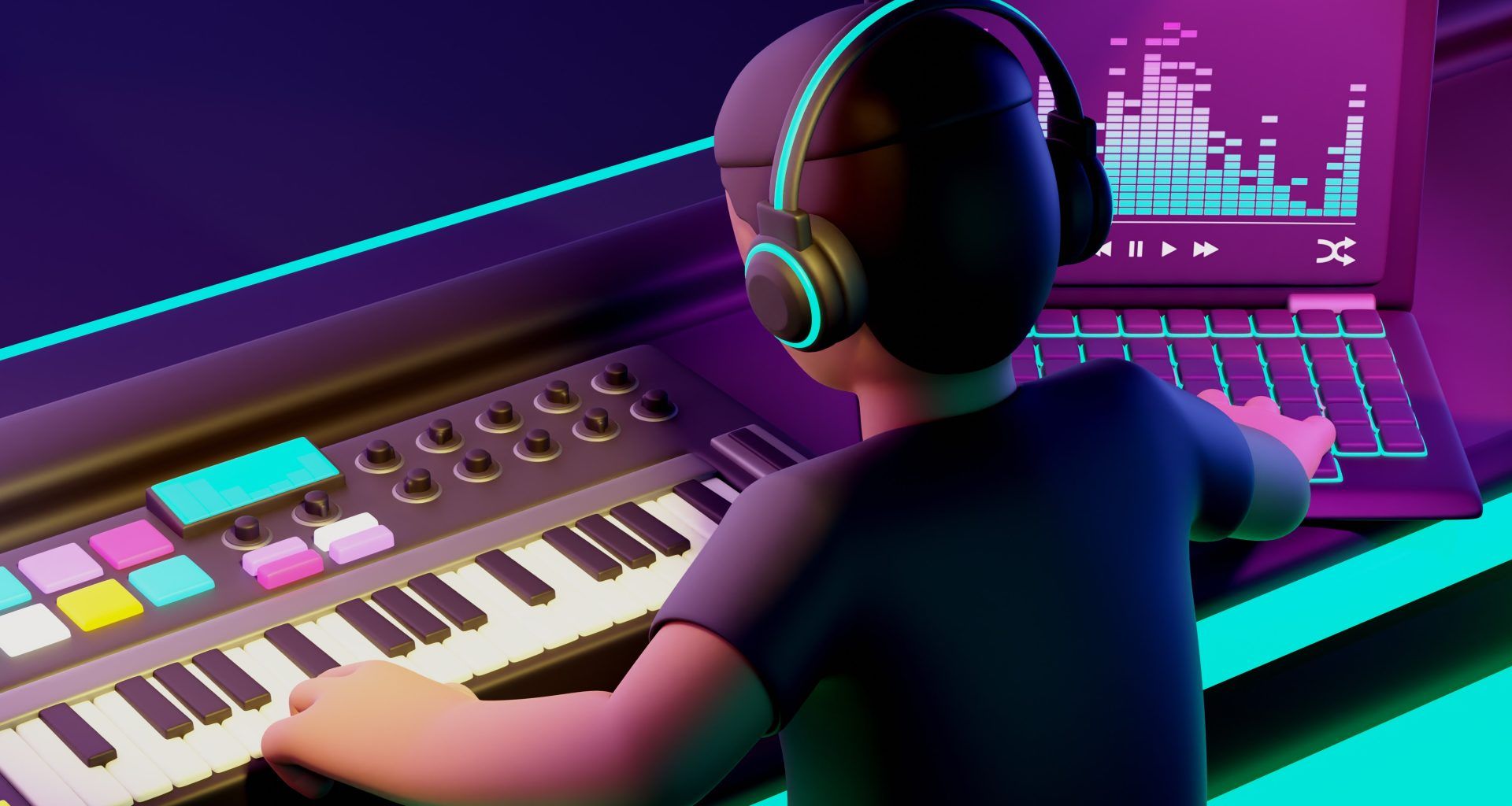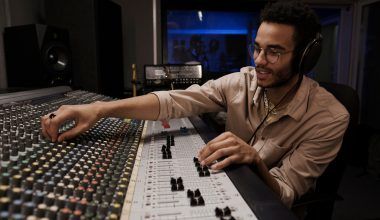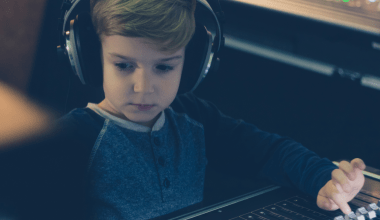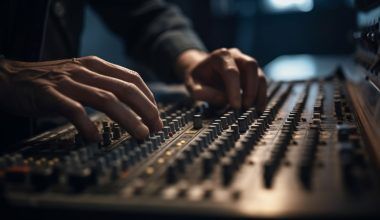In the dynamic world of music production, AI mastering software has emerged as a game-changer, transforming how artists polish their tracks. This technology utilizes artificial intelligence to analyze and enhance audio, delivering professional-quality sound with unparalleled ease and efficiency. In this comprehensive guide, we delve into the intricacies of it, highlighting its benefits, the best tools available, and how it stands against traditional mastering methods.
What is AI Mastering Software?
AI mastering software leverages advanced algorithms and machine learning to automate the mastering process. Traditional mastering, a crucial step in music production, involves fine-tuning the audio to achieve a balanced, polished sound. This process can be time-consuming and requires specialized skills. It simplifies this by using artificial intelligence to perform similar tasks quickly and accurately, making high-quality mastering accessible to everyone.
How Does AI Mastering Software Work?
AI mastering operates through several key stages:
- Upload and Analysis: The user uploads their track to the AI mastering platform. The software then analyzes the audio, examining elements such as frequency balance, dynamic range, and stereo width.
- Adjustment Application: Based on its analysis, the AI applies various enhancements and adjustments to optimize the audio quality. This might include equalization, compression, limiting, and other processing techniques.
- Output Generation: Once the adjustments are made, the software generates the final mastered track, which is ready for distribution.
Benefits of AI Mastering Software
- Cost-Effective: Traditional mastering can be expensive, often requiring the expertise of a professional mastering engineer. AI mastering software provides a budget-friendly alternative without compromising on quality.
- Time-Efficient: AI mastering software delivers results within minutes, compared to the hours or days traditional mastering might take.
- Consistency: The AI ensures consistent sound quality across multiple tracks, making it ideal for albums and EPs.
- Accessibility: Even independent artists with limited resources can achieve professional-grade mastering.
- User-Friendly: Most AI mastering tools are designed to be intuitive, requiring no prior technical knowledge.
The Best AI Mastering Software
When looking for the best AI mastering software, several options stand out due to their features, ease of use, and quality of output:
- Deliver My Tune
- LANDR
- eMastered
- CloudBounce.
- AI Mastering
- BandLab
AI Mastering Software vs. Traditional Mastering
While AI mastering software offers numerous benefits, it’s essential to understand how it compares to traditional mastering:
- Quality: Traditional mastering engineers bring a human touch and subjective expertise that AI might lack. However, AI mastering software is continually improving and can produce results that rival human mastering.
- Customization: Traditional mastering allows for more detailed and personalized adjustments. Some AI mastering tools offer customization options, but they may not be as nuanced as those provided by human engineers.
- Cost and Time: AI mastering is more cost-effective and quicker than traditional mastering, making it a preferred choice for many independent artists.
How to Get the Best Results with AI Mastering Software
- Prepare a Good Mix: Ensure your mix is balanced and free from major issues before uploading it to the AI mastering software. A well-mixed track will yield better results.
- Understand the Tool: Familiarize yourself with the AI mastering software you’re using. Each tool has its strengths and features, so knowing how to navigate and utilize these will help you get the best outcome.
- Compare Versions: Many AI mastering tools allow you to compare different versions of the mastered track. Use this feature to select the best-sounding version.
- Use Reference Tracks: Compare your mastered track to professionally mastered tracks in the same genre. This will help you gauge the quality and make any necessary adjustments.
The Future of AI Mastering Software
The advancements in AI technology promise an exciting future for AI mastering software. As machine learning algorithms become more sophisticated, we can expect even higher quality and more nuanced mastering capabilities. Additionally, integration with other music production tools will likely become seamless, offering a comprehensive solution for artists.
Case Studies: Artists Using AI Mastering Software
- Independent Artists: Many independent artists have successfully used AI mastering software to polish their tracks and release professional-sounding music without breaking the bank.
- Record Labels: Some record labels incorporate AI mastering into their workflow for preliminary mastering, saving time and resources before finalizing the tracks with a human engineer.
FAQs
What is AI mastering software?
It uses artificial intelligence to automatically enhance and optimize the audio quality of music tracks.
How does AI mastering software work?
The software analyzes the uploaded audio file, applies necessary adjustments such as equalization and compression, and generates a final mastered track.
Is AI mastering software as good as traditional mastering?
While it is highly advanced, traditional mastering by a skilled engineer can offer more personalized and nuanced results. However, AI mastering is continually improving and can produce excellent quality.
What are the best AI mastering tools available?
Some of the best AI mastering tools include LANDR, eMastered, CloudBounce, AI Mastering, and BandLab.
Can AI mastering software replace human mastering engineers?
It can complement the work of human mastering engineers, especially for quick and cost-effective solutions. However, for highly customized and intricate mastering, human engineers still play a crucial role.
Diving Deeper: The Technical Side of AI Mastering Software
AI mastering software is powered by sophisticated technologies that enable it to analyze and enhance audio tracks with remarkable precision. Understanding the technical aspects can help you appreciate the capabilities and potential of these tools.
Machine Learning Algorithms
At the core of AI mastering are machine learning algorithms. These algorithms are trained on vast datasets of professionally mastered tracks. By learning from these examples, the AI can identify patterns and apply similar techniques to new audio files. Key aspects of these algorithms include:
- Training Data: The quality and diversity of the training data are crucial. High-quality datasets that include various genres and styles enable the AI to perform well across different types of music.
- Feature Extraction: The AI extracts features from the audio, such as frequency components, dynamics, and spectral characteristics. This detailed analysis helps the software understand the nuances of the track.
Neural Networks
Neural networks play a significant role in AI mastering software. These networks are designed to mimic the human brain’s structure, allowing the AI to make complex decisions. In the context of audio mastering, neural networks help the AI understand the relationship between different audio elements and apply appropriate enhancements.
- Deep Learning: Deep learning techniques involve multiple layers of neural networks, each focusing on different aspects of the audio. This layered approach allows for more detailed and accurate processing.
- Adaptive Learning: Neural networks can adapt and improve over time. As the AI is exposed to more data and feedback, it becomes better at mastering tracks.
Audio Processing Techniques
It employs a range of audio processing techniques to enhance tracks. These techniques include:
- Equalization (EQ): Adjusting the balance of frequencies in the audio to achieve a clear and balanced sound.
- Compression: Controlling the dynamic range of the audio to ensure consistency in volume levels.
- Limiting: Preventing audio peaks from exceeding a certain level, avoiding distortion.
- Stereo Imaging: Enhancing the spatial characteristics of the audio, creating a wider and more immersive sound.
Integrating AI Mastering Software into Your Workflow
Integrating AI Mastering into your music production workflow can streamline the mastering process and enhance the quality of your tracks. Here are some tips for effective integration:
- Choose the Right Software: Select AI mastering software that fits your needs and budget. Consider factors such as ease of use, features, and the quality of output.
- Workflow Integration: Incorporate AI mastering as a regular part of your production process. Use it for initial mastering and then make any necessary tweaks.
- Feedback Loop: Use the AI mastering software’s output as a learning tool. Analyze the changes made by the AI and apply similar techniques in your future mixes.
- Experimentation: Don’t be afraid to experiment with different settings and features. This can help you discover new ways to enhance your tracks.
The Ethical Considerations of AI in Music
As AI continues to evolve and integrate into various industries, including music production, it’s important to consider the ethical implications. Some key considerations include:
- Job Displacement: The rise of this software could impact the demand for human mastering engineers. While AI offers cost and time benefits, it’s crucial to balance its use with the expertise and creativity of human professionals.
- Quality Control: It can produce high-quality results, but it’s essential to ensure that the output meets industry standards. Regularly comparing AI-mastered tracks with human-mastered ones can help maintain quality.
- Transparency: Artists and producers should be transparent about the use of AI in their production process. This transparency can help manage expectations and foster trust with listeners and industry professionals.
Looking Ahead: The Future of AI in Music Production
The future of AI in music production is bright, with continuous advancements promising even more powerful and versatile tools. Some potential developments include:
- Enhanced Customization: Future may offer more detailed customization options, allowing users to fine-tune their tracks with greater precision.
- Real-Time Processing: As technology improves, AI mastering could become capable of real-time processing, enabling live mastering during performances or streaming sessions.
- Collaborative AI: AI tools could become more collaborative, working alongside human engineers to provide suggestions and improvements while retaining the human touch.
- Integration with DAWs: Deeper integration with Digital Audio Workstations (DAWs) could streamline the production process, making it easier to apply AI mastering directly within the DAW environment.
Conclusion
AI mastering software is revolutionizing the music industry, offering artists an accessible, cost-effective, and efficient way to achieve professional-quality mastering. Whether you’re an independent artist or part of a record label, leveraging the power of AI can significantly enhance your music production process. As technology continues to advance, the future of AI mastering looks promising, with even more sophisticated tools and capabilities on the horizon.
By understanding how it works and exploring the best tools available, you can take your music to new heights, ensuring it sounds polished and professional. Embrace the future of music production with this and let your creativity shine.
For further reading, explore these related articles:
- How will AI change the future of the music industry?
- 10 Iconic Indian Musicians of All Time
- 40 Ways to Earn Money as a Musician
For additional resources on music marketing and distribution, visit Deliver My Tune.






